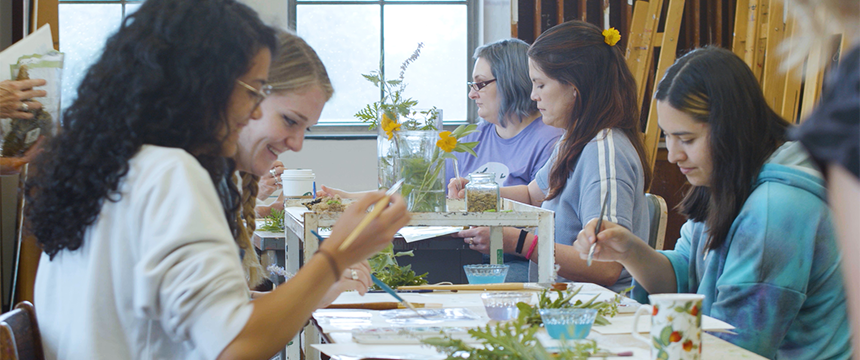Art Therapy Programs
Bachelor of Arts in Art Therapy
The bachelor's degree in Art Therapy at NDMU provides the foundation to pursue a rewarding career in one of the newest specializations within the helping professions. Core classes in art and psychology introduce concepts in human development and psychological theories, as well as techniques for counseling and creating art. Through hands-on learning which includes a final practicum, successful graduates are prepared to pursue graduate school, a requirement for becoming a professional art therapist.
Accelerated 5-Year Program
Those that qualify may also pursue an accelerated pathway to earn both the BA and MA in Art Therapy at NDMU in just five years.
Master of Arts in Art Therapy
Notre Dame's MA in Art Therapy is the only master's art therapy program in Maryland that prepares graduates to become professional art therapists.
Art Therapy training at NDMU includes regular, course-integrated art making; visual, written, and verbal self-reflection; immediate and sustained practical application of course material and theory; research; and two full academic years of field based instruction and experience.
Program Mission
Founded in 2018, the Master of Arts in Art Therapy Program provides classroom and field-based instruction and training in clinical art therapy. At Notre Dame of Maryland University, building on its tradition to educate students who transform their communities and work toward a culture of inclusivity and social responsibility, the mission of the Art Therapy Program is to prepare clinicians who will give back to and meaningfully serve their communities through delivery of culturally attuned, social justice forward, inclusive art therapy practices. The NDMU Art Therapy Program goal is to prepare competent, entry-level art therapists in the cognitive (knowledge), psychomotor (skills) and affective (behavior) learning domains as per ACATE Educational Standards. Students therefore learn to support client well-being and exploration of problems through clinically informed creative, art-based expression. Students also learn the skills involved in safely managing the responses evoked by the creative process in therapy with individuals at all stages of life.
The Master of Arts in Art Therapy Program goals and supporting learning domains articulated below weave the importance of informed, socially responsive practice in alignment with local community and regional employment needs throughout the curriculum and serve to make practical application of Notre Dame’s mission through training that emphasizes self-reflexivity, social responsibility, inclusivity, and service within and for community. The goals and learning domains provide a structure that, while grounded in history and theory, challenge students during training to practically engage with, to critique, and to further research practice orientations that hold art-relational, culturally attuned work central and align with their personal and professional values and aptitudes.
Learning Goals


